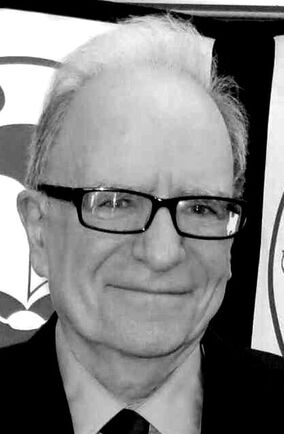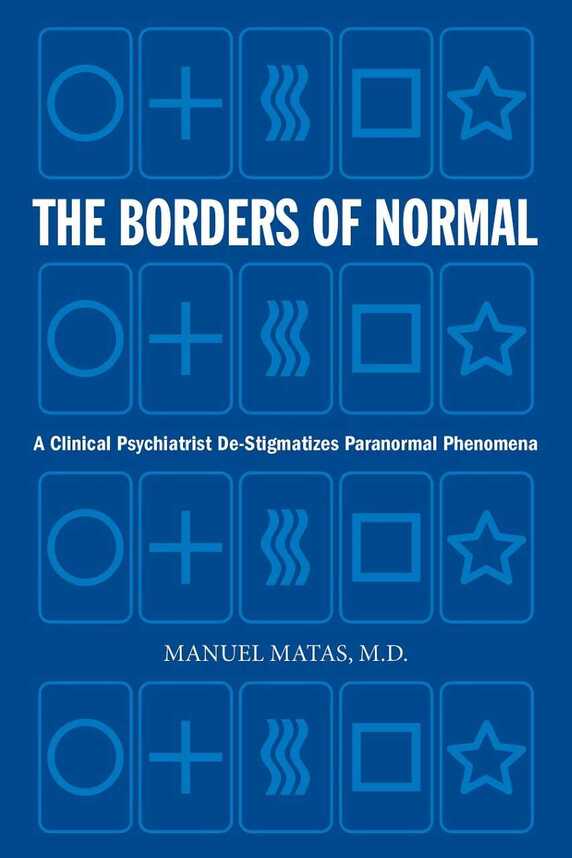
It gives me great pleasure to welcome Dr. Manuel Matas onto the website today. Manuel is a clinical psychiatrist with forty years experience working in the mental health field. His book The Borders of Normal: A Clinical Psychiatrist De-Stigmatizes Paranormal Phenomena, is a no.1 Amazon bestseller.
Alex: Tell me a bit about yourself, Manuel and when you first began writing.
Manuel: I am a psychiatrist, author, portrait artist, photographer, and public speaker.
I received my medical degree from the University of Manitoba and my Diploma in Psychiatry from McGill University. Prior to switching to Medicine I was in the Honours English program. After my English professor heard I had gone into Medicine, he said. "What a waste."
I've had a couple of solo photography exhibitions and I'm an Elected Member of the Portrait Society of Canada.
I was born and raised in the Canadian Prairies, where the sky is blue and the air is clean (or at least it was before those damn forest fires).
As a teenager I wrote a poem called Danky Doom. I never showed it to anyone.
Throughout my psychiatric career I published articles in peer-reviewed journals and read papers at national psychiatric conferences.
One of my hobbies is writing letters-to-the-editor of Canada's national newspaper, The Globe and Mail, which has published hundreds of my letters-to-the-editor since 1983.
I've written numerous poems, stories, and articles, and now my first book, The Borders of Normal.
Alex: Tell me a bit about yourself, Manuel and when you first began writing.
Manuel: I am a psychiatrist, author, portrait artist, photographer, and public speaker.
I received my medical degree from the University of Manitoba and my Diploma in Psychiatry from McGill University. Prior to switching to Medicine I was in the Honours English program. After my English professor heard I had gone into Medicine, he said. "What a waste."
I've had a couple of solo photography exhibitions and I'm an Elected Member of the Portrait Society of Canada.
I was born and raised in the Canadian Prairies, where the sky is blue and the air is clean (or at least it was before those damn forest fires).
As a teenager I wrote a poem called Danky Doom. I never showed it to anyone.
Throughout my psychiatric career I published articles in peer-reviewed journals and read papers at national psychiatric conferences.
One of my hobbies is writing letters-to-the-editor of Canada's national newspaper, The Globe and Mail, which has published hundreds of my letters-to-the-editor since 1983.
I've written numerous poems, stories, and articles, and now my first book, The Borders of Normal.

Alex: Are there particular themes/stories that you like to explore?
Manuel: Yes, I'm drawn to anything weird, strange, paranormal, uncanny, supernatural, or miraculous. I especially like stories involving synchronicity.
Alex: Do you rely on a synopsis or set out with a vague idea and let the thing evolve?
Manuel: It depends on what I'm writing but I would say more the former than the latter, although I wouldn't use the word 'Synopsis'; it's more like an Outline, preferably in point form. I think it's a good way for me to get organized. It hasn't happened yet but I keep hoping.
Alex: Tell us about your latest book.
Manuel: My latest book, also my only book, my first book, but not my last book, is The Borders of Normal: A Clinical Psychiatrist De-Stigmatizes Paranormal Phenomena. Throughout my life I have had a number of paranormal experiences, including near-death and out-of-body experiences, visions, precognitive dreams, and angelic visitations. Many people who have these types of experiences are reluctant to talk about them because they are afraid of being judged or they think they are losing their minds. My intention in writing my book is to help readers distinguish between psychic and psychotic and to give them permission to talk about their own experiences, since these types of experiences are exceedingly common but we don't think they're common because people don't talk about them. They are held back by stigma, bias, and prejudice against anything that goes against conventional wisdom about what is and what is not normal.
Alex: What is the first book you read?
Manuel: When I was very young I remember reading the Noddy books by Enid Blighton. I liked the illustrations as well as the story. I just googled her and found out her books sold over 600 million copies and were translated into 90 languages. As a teenager I fell in love with Nabokov's Pale Fire.
Alex: How much research do you do?
Manuel: A ton. The Borders of Normal has a Bibliography with 381 References. I spent several years doing research before I wrote my book.
Alex: Do you rely heavily on the internet?
Manuel: Yes, but also books, magazines, newspapers, movies, plays, TV, and personal communication.
Alex: What are your interests aside from writing?
Manuel: Politics, nature, current events (by which I mean covid and the climate crisis), reading, photography, drawing, visiting, walking.
I have been drawing faces since I was knee-high to a grasshopper.
Alex: What is the last book that blew you away?
Manuel: Several recent favorites: The Midnight Library, by Matt Haig; Signs, by Laura Lynn Jackson; The Overstory, by Richard Powers; Where the Crawdads Sing, by Delia Owens; Shuggie Bain, by Douglas Stuart; Based on a True Story, by Delphine de Vigan; The Idiot, by Elif Batuman; Sapiens, by Yuval Noah Harari; and The Splendid and the Vile, by Erik Larson.
Alex: What are you currently working on?
Manuel: My next book will explore the nature of time. Is time an illusion? Is time a mental construct? The word time is derived from an Indo-European root meaning "to divide". We divide time and time divides us. We divide time into hours, minutes, and seconds. Time divides us against each other, against Nature, and against our true selves. We see time as linear. We think cause precedes effect. But what if effect can precede cause?
Alex: Thank you so much, Manuel for taking time out to share your writing journey with us. Your book sounds fascinating. And best of luck with your other book - not to mention your other numerous activities.
Manuel: Thank you Alex. It's very kind of you to invite me over.
Manuel: Yes, I'm drawn to anything weird, strange, paranormal, uncanny, supernatural, or miraculous. I especially like stories involving synchronicity.
Alex: Do you rely on a synopsis or set out with a vague idea and let the thing evolve?
Manuel: It depends on what I'm writing but I would say more the former than the latter, although I wouldn't use the word 'Synopsis'; it's more like an Outline, preferably in point form. I think it's a good way for me to get organized. It hasn't happened yet but I keep hoping.
Alex: Tell us about your latest book.
Manuel: My latest book, also my only book, my first book, but not my last book, is The Borders of Normal: A Clinical Psychiatrist De-Stigmatizes Paranormal Phenomena. Throughout my life I have had a number of paranormal experiences, including near-death and out-of-body experiences, visions, precognitive dreams, and angelic visitations. Many people who have these types of experiences are reluctant to talk about them because they are afraid of being judged or they think they are losing their minds. My intention in writing my book is to help readers distinguish between psychic and psychotic and to give them permission to talk about their own experiences, since these types of experiences are exceedingly common but we don't think they're common because people don't talk about them. They are held back by stigma, bias, and prejudice against anything that goes against conventional wisdom about what is and what is not normal.
Alex: What is the first book you read?
Manuel: When I was very young I remember reading the Noddy books by Enid Blighton. I liked the illustrations as well as the story. I just googled her and found out her books sold over 600 million copies and were translated into 90 languages. As a teenager I fell in love with Nabokov's Pale Fire.
Alex: How much research do you do?
Manuel: A ton. The Borders of Normal has a Bibliography with 381 References. I spent several years doing research before I wrote my book.
Alex: Do you rely heavily on the internet?
Manuel: Yes, but also books, magazines, newspapers, movies, plays, TV, and personal communication.
Alex: What are your interests aside from writing?
Manuel: Politics, nature, current events (by which I mean covid and the climate crisis), reading, photography, drawing, visiting, walking.
I have been drawing faces since I was knee-high to a grasshopper.
Alex: What is the last book that blew you away?
Manuel: Several recent favorites: The Midnight Library, by Matt Haig; Signs, by Laura Lynn Jackson; The Overstory, by Richard Powers; Where the Crawdads Sing, by Delia Owens; Shuggie Bain, by Douglas Stuart; Based on a True Story, by Delphine de Vigan; The Idiot, by Elif Batuman; Sapiens, by Yuval Noah Harari; and The Splendid and the Vile, by Erik Larson.
Alex: What are you currently working on?
Manuel: My next book will explore the nature of time. Is time an illusion? Is time a mental construct? The word time is derived from an Indo-European root meaning "to divide". We divide time and time divides us. We divide time into hours, minutes, and seconds. Time divides us against each other, against Nature, and against our true selves. We see time as linear. We think cause precedes effect. But what if effect can precede cause?
Alex: Thank you so much, Manuel for taking time out to share your writing journey with us. Your book sounds fascinating. And best of luck with your other book - not to mention your other numerous activities.
Manuel: Thank you Alex. It's very kind of you to invite me over.
